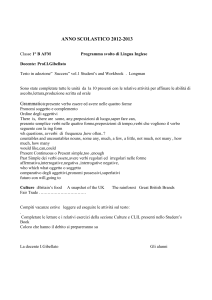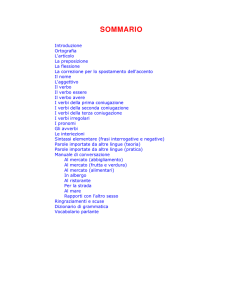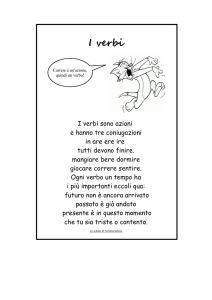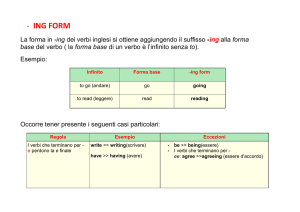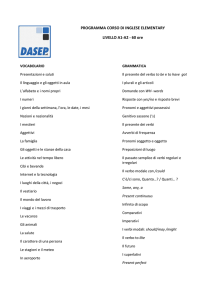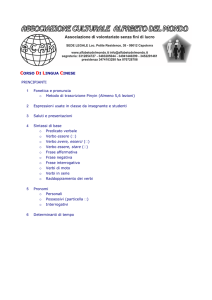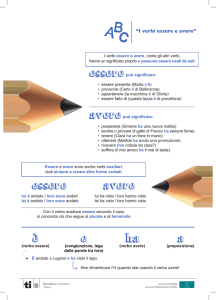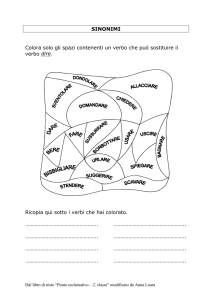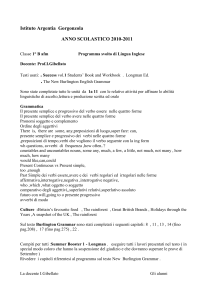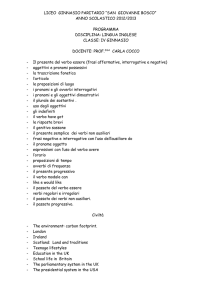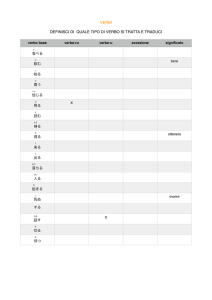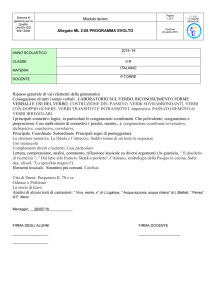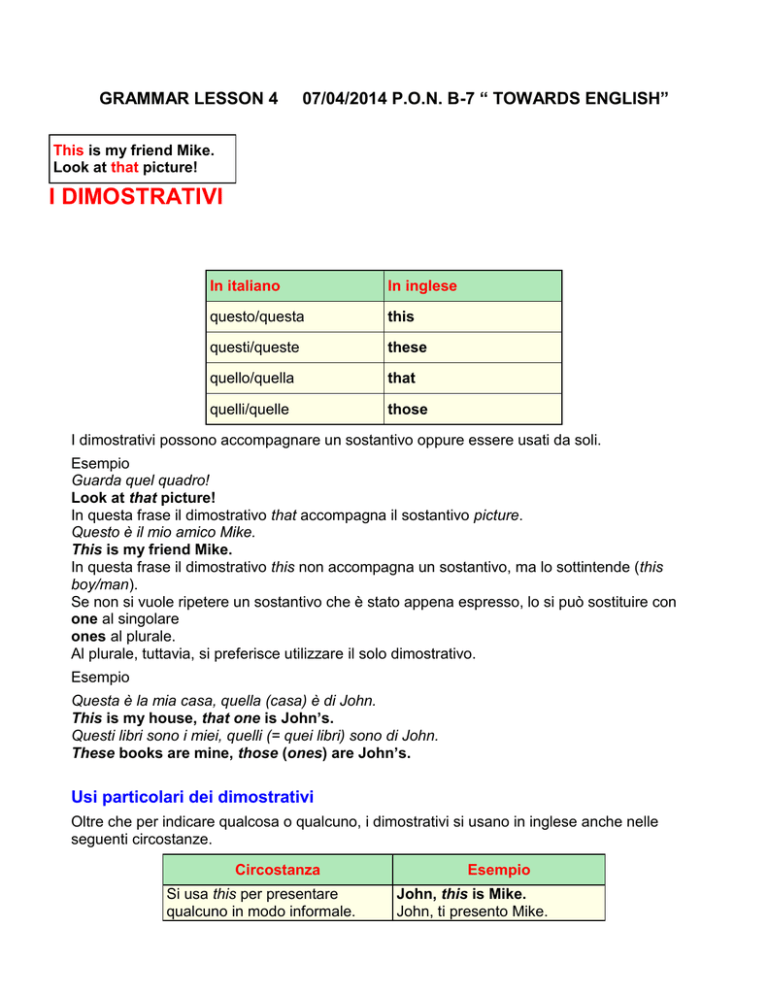
GRAMMAR LESSON 4
07/04/2014 P.O.N. B-7 “ TOWARDS ENGLISH”
This is my friend Mike.
Look at that picture!
I DIMOSTRATIVI
In italiano
In inglese
questo/questa
this
questi/queste
these
quello/quella
that
quelli/quelle
those
I dimostrativi possono accompagnare un sostantivo oppure essere usati da soli.
Esempio
Guarda quel quadro!
Look at that picture!
In questa frase il dimostrativo that accompagna il sostantivo picture.
Questo è il mio amico Mike.
This is my friend Mike.
In questa frase il dimostrativo this non accompagna un sostantivo, ma lo sottintende (this
boy/man).
Se non si vuole ripetere un sostantivo che è stato appena espresso, lo si può sostituire con
one al singolare
ones al plurale.
Al plurale, tuttavia, si preferisce utilizzare il solo dimostrativo.
Esempio
Questa è la mia casa, quella (casa) è di John.
This is my house, that one is John’s.
Questi libri sono i miei, quelli (= quei libri) sono di John.
These books are mine, those (ones) are John’s.
Usi particolari dei dimostrativi
Oltre che per indicare qualcosa o qualcuno, i dimostrativi si usano in inglese anche nelle
seguenti circostanze.
Circostanza
Si usa this per presentare
qualcuno in modo informale.
Esempio
John, this is Mike.
John, ti presento Mike.
Si usa this is… e that is… al
telefono.
This è riferito a chi parla e lo si
usa per presentarsi.
That è riferito all’interlocutore ed
è solitamente utilizzato per
chiedere se si sta parlando con la
persona che si cerca.
Si usa that per indicare ciò che
qualcuno ha appena detto o che
è appena successo.
Hello, this is Mike!
Pronto, sono Mike!
Hello, is that Susan?
Pronto, parlo con Susan?
Hello, is that you, Susan?
Pronto, sei tu Susan?
Yes, that’s right!
Si, giusto!
That is - that is to say…
Cioè…
That was a great party!
È stata proprio una bella festa!
Nel linguaggio corrente informale
un dimostrativo può
accompagnare un aggettivo,
assumendo quindi significato
avverbiale.
Si possono utilizzare i
dimostrativi al posto del soggetto
it per enfatizzare ciò che si sta
dicendo.
It's this small.
È piccolo così.
It's that easy.
È così semplice/ È tutto qui.
But that’s wrong!
Ma è sbagliato!
COUNTABLES - UNCOUNTABLES
I sostantivi inglesi si dividono in due grandi categorie, countables e uncountables.
Countable nouns
Sono i sostantivi numerabili, cioè che si possono contare, davanti ai quali si può
mettere un numero.
Esempi:
Book (libro) è countable, i libri si possono contare: posso dire "due libri, tre libri".
Coin (moneta) è countable, le monete si possono contare.
Litre (litro) è countable, i litri si possono contare.
Davanti ai countables si può mettere l’articolo indeterminativo singolare A /AN.
Es. a book, a coin, a litre (of milk).
Uncountable nouns
Sono i sostantivi non numerabili, cioè che non si possono contare. Sono sostantivi
davanti ai quali non può essere messo un numero.
Esempi:
Milk (latte) è uncountable, non si può contare. Si possono contare i litri di latte, i
bicchieri di latte, ma davanti alla parola "milk" non posso mettere un numero.
Money (denaro) è uncountable. Posso contare le monete, le banconote, le sterline,
ma davanti alla parola "money" non posso mettere un numero.
Davanti agli uncountables non si può usare l’articolo indeterminativo singolare A /
AN.
(Non si può dire "A milk" - un latte)
Per quantificare i sostantivi non numerabili si ricorre ad espressioni come :
A drop of milk - una goccia di latte (la parola drop, goccia, è countable).
A glass of milk - un bicchiere di latte
Some milk - del latte
Is there anybody at home?
Yes, there is somebody at home, but
there is nobody in the garden.
COMPOSTI DI SOME - ANY - NO
I composti di some, any e no si comportano come gli aggettivi indefiniti da cui sono formati:
I composti di some si usano in frasi affermative, ed in frasi interrogative quando si offre o si
chiede per avere qualcosa.
I composti di any si usano in frasi interrogative e negative. In frasi affermative hanno il
significato di qualunque, qualsiasi.
I composti di no si usano in frasi che hanno significato negativo, ma il verbo deve essere
sempre in forma affermativa.
Something - anything - nothing (qualcosa, niente)
Have you got anything to do, today? (Hai qualcosa da fare, oggi?)
I have got something to do. (Ho qualcosa da fare.)
I haven't got anything to do. (Non ho niente da fare.)
I have got nothing to do. (Non ho niente da fare.)
Somebody - anybody - nobody
Someone - anyone - no one
(Qualcuno, nessuno)
Is there anybody at home? (C'è qualcuno in casa?)
There is somebody at home. (C'è qualcuno in casa.)
There is nobody at home. (Non c'è nessuno in casa.)
There isn't anybody at home.
Somewhere - anywhere - nowhere
(Da qualche parte, da nessuna parte)
I can't find my book, but it must be somewhere.
(Non riesco a trovare il mio libro, deve essere da qualche parte.)
I can't find it anywhere. (Non riesco a trovarlo da nessuna parte.)
It could be anywhere. (Potrebbe essere in qualunque posto)
Where are you going? Nowhere. (Dove vai? Da nessuna parte.)
CAN
Significati di "can"
Can significa
Esempio
I can swim.
So nuotare.
Mark can speak English very well.
Mark sa parlare inglese molto bene.
My father can come tomorrow.
Potere, quando la possibilità di
Mio padre può venire domani = ha la
compiere un’azione dipende dal
possibilità di venire, dipende da lui (per
soggetto: ho la possibilità di…
esempio, ha un giorno di ferie, ha la macchina
a disposizione etc…).
I can pass the exam.
Posso passare l’esame = ne ho la possibilità
(perché ho studiato molto, sono ben
preparato etc…).
Potere, quando si chiede il permesso Can I take the car?
di fare qualche cosa (inglese parlato Posso usare la macchina?
informale) oppure per dire ciò che è o You can’t smoke at school.
Non puoi fumare a scuola = non si può
non è consentito fare.
fumare a scuola.
Can you hear that noise?
Can è utilizzato con i verbi di
Riesci a sentire / Senti quel rumore?
percezione. In questo caso spesso
I can see him!
non viene tradotto in italiano.
Lo vedo!
Sapere, nel senso di saper fare
qualche cosa.
Forme verbali di can
Can: Simple Present.
Forma negativa: cannot >>> can’t
I can swim.
So nuotare.
Mark can’t swim.
Mark non sa nuotare.
Could: Simple Past e Condizionale.
Forma negativa: could not >>> couldn’t
She could walk when she was 10 months old.
Sapeva camminare quando aveva 10 mesi (Simple Past).
You could pass the exam if you studied harder.
Potresti passare l’esame se tu studiassi di più (Condizionale).
To be able + infinito è utilizzato per tutti gli altri tempi verbali, per i quali can non ha
una forma propria.
Il verbo to be viene coniugato al tempo desiderato.
I won’t be able to come to your party tomorrow.
Non potrò venire alla tua festa domani (Futuro).
Al Simple Present si possono utilizzare sia la forma can che to be able + inf. quando significa
avere la possibilità di / riuscire a…
Can you speak any foreign languages? = Are you able to speak any foreign languages?
Sai parlare qualche lingua straniera?
Al Simple Past si usa could per parlare di un’abilità generica a fare qualche cosa, was/were
able + inf. per parlare di qualche cosa che si è riusciti a fare in una particolare occasione. In
quest’ultimo caso si può anche usare la forma managed + infinito.
When I was 18, I could play tennis really well.
Quando avevo 18 anni sapevo giocare a tennis veramente bene (abilità generale).
John and I had a game of tennis last week. In the end I was able to beat him / I managed
to beat him.
John ed io abbiamo fatto una partita a tennis la scorsa settimana. Alla fine sono riuscito a
batterlo (circostanza particolare).
Nella forma negativa del Simple Past si può usare could anche quando ci si riferisce ad una
circostanza particolare.
I played well last night, but I couldn’t / wasn’t able to beat John.
Ho giocato bene ieri sera, ma non sono riuscito a battere John.
Sempre al Simple Past, si usa could (e non was/were able to) con i verbi di percezione o con
quelli che indicano attività di pensiero:
- To see (vedere)
- To hear (udire)
- To smell (odorare, sentire un odore)
- To taste (gustare, sentire un sapore)
- To feel (sentire, sia in senso fisico che emotivo)
- To remember (ricordare)
- To understand (capire)
Although he was speaking in a low voice, I could understand what he was saying.
Sebbene parlasse a voce bassa, riuscii a capire ciò che stava dicendo.
-ING FORM
La forma in -ing dei verbi inglesi si ottiene aggiungendo il suffisso
-ing alla forma base del verbo ( la forma base di un verbo è l’infinito senza to).
Esempio:
Infinito
Forma base
-ing form
to go (andare)
go
going
to read (leggere)
read
reading
Occorre tener presente i seguenti casi particolari:
Regola
I verbi che
terminano per -e
perdono la e finale
I verbi che
terminano per una
sola consonante
preceduta da una
sola vocale
accentata
raddoppiano la
consonante finale.
I verbi che
terminano per -l
preceduta da una
sola vocale
raddoppiano
sempre la l finale.
NOTA:
Esempio
Eccezioni
write >> writing
(scrivere)
be >> being
(essere)
have >> having
(avere)
age >>
ageing
(invecchiare)
dye >>
dyeing
(tingere)
singe >>
singeing
(strinare)
I verbi che
terminano per
-ee: agree >>
agreeing
(essere
d'accordo)
stop >>stopping
(fermarsi)
admit >>admitting
(ammettere)
travel >>travelling
(viaggiare)
I verbi che terminano per -y o per -i mantengono la y e la i finale prima della
desinenza -ing.
Esempio:
To study >> studying (studiare)
To ski >> skiing (sciare)
USO DELLA -ING FORM
1. La -ing form si usa per costruire i tempi progressivi.
Tutti i tempi verbali inglesi hanno un corrispondente tempo progressivo. Per
costruire i tempi progressivi si segue sempre il seguente schema:
SOGG. + TO BE al tempo corrispondente + -ING FORM
del verbo della frase
Esempio:
Tempo verbale
Infinito to go
Simple Present I go
Simple past I went
Future Simple I will go
Tempo progressivo
Infinito progressivo to be going
Present Continuous I am going
Past Continuous I was going
Future Continuous I will be
going
Alcuni tempi progressivi (Present Continuous, Present Perfect Continuous, Past
Continuous) hanno un uso proprio, altri si usano al posto del tempo corrispondente
per dare l’idea dell’azione colta nel corso del suo svolgimento. Solitamente nel
tradurre dall’inglese si usa in italiano il tempo corrispondente.
Tutti i verbi hanno la -ing form, ma non tutti i verbi possono essere utilizzati nei tempi
progressivi. I verbi che indicano uno stato di fatto, una condizione in cui ci si trova e
non un'azione dinamica, non vengono utilizzati nei tempi progressivi.
I principali verbi che non vengono utilizzati nei tempi progressivi (state verbs) sono:
To want (volere)
To like (piacere)
I verbi che indicano sentimenti (to love, amare - to hate, odiare ecc…)
I verbi di percezione (to hear, udire - to see, vedere ecc…)
I verbi che indicano attività intellettuale (to know, sapere - to understand,
capire ecc…)
I verbi che indicano possesso (to have, avere - to own, possedere)
2. La -ing form si usa per esprimere il Participio Presente.
Il participio presente non è molto usato in italiano, perché solitamente si preferisce
l’uso di perifrasi con il pronome relativo.
Esempio:
An ageing population >> una popolazione invecchiante >> una popolazione che
invecchia
(To age = invecchiare)
3. Si usa la -ing form per esprimere il Gerundio di un verbo.
Esempio:
Playing >> giocando
4. Si usa la -ing form per esprimere l’Infinito sostantivato di un verbo, cioè quando
un verbo svolge nella frase il ruolo di un sostantivo.
Esempio:
Leggere libri inglesi è utile per imparare l’inglese.
Leggere = la lettura
Reading English books is useful to learn English.
5. Si usa in inglese la -ing form quando un verbo è preceduto da una
preposizione.
Esempio:
Mark è bravo a nuotare.
Mark is good at swimming. (at è una preposizione)
6. Alcuni verbi inglesi reggono la -ing form, cioè sono seguiti da un altro verbo
che viene messo nella -ing form.
Esempio:
Stop laughing!
Smetti di ridere!
(Il verbo to stop regge la -ing form)
ESERCIZI LESSON 4
07/04/2014 P.O.N. B-7 “ TOWARDS ENGLISH”
SUI DIMOSTRATIVI THIS, THAT, THESE, THOSE
Put THIS, THAT, THESE or THOSE into the following sentences:
1) Now you are sitting in it, can’t you see how comfortable
car is!
ow you are sitting in it, can’t you see how comfortable this car is!
2) What was
film you saw yesterday about?
What was that film you saw yesterday about?
3)
are terrible times.
INTERMEDIATE
These are terrible times.
4)
books are mine and
books are mine and those are yours.
are yours.
5) Look!
boys are falling into the water!
ook! Those boys are falling into the water!
6) It was 1999.
was my first trip to America.
was 1999. That was my first trip to America.
7) Hello, Peter.
pupils are John and Susan. They come from London.
Hello, Peter. These pupils are John and Susan. They come from London.
8)
children are Lena’s daughters. They’re beautiful.
(OR those) children are Lena’s daughters. They’re beautiful.
9)
bag over there isn’t mine. It’s Susan’s.
hat bag over there isn’t mine. It’s Susan’s.
10) “Hello, is
Sue?” - “Yes, it is”.ello, is that Sue?” - “Yes, it is”.
Non comprerò quel golfino perché è troppo costoso.
questo palazzo.
COUNTABLES E UNCOUNTABLES
BEGINNERS
Write if the following names are countable or uncountable
1) Coin
♥ Countable
2) Picture
♥ Countable
3) Electricity
♥ Uncountable
4) Information
♥ Uncountable
5) Cheese
♥ Uncountable
6) Money
♥ Uncountable
7) Hat
♥ Countable
8) Price
♥ Countable
GB124
9) Love
♥ Uncountable
10) Music
♥ Uncountable
!
ESERCIZIO SU SOME, ANY
INTERMEDIATE
GB
Fill in the gaps with SOME or ANY
1) I haven’t got
coffee, but I can give you
♥ I haven’t got any coffee, but I can give you some milk.
milk.
2) They asked me
strange questions.
♥ They asked me some strange questions.
3) We can’t see
orange juice in the fridge.
♥ We can’t see any orange juice in the fridge.
4) Would you like
biscuits?
♥ Would you like some biscuits?
5) When my grandfather was a child, there weren’t
houses here.
♥ When my grandfather was a child, there weren’t any houses here.
6) My colleague never does
♥ My colleague never does any work.
work.
7) Can we have
tea, please?
♥ Can we have some tea, please?
8) They haven’t found
difficulty with this exercise.
♥ They haven’t found any difficulty with this exercise.
9) Shall I give you
chocolate, dear?
♥ Shall I give you some chocolate, dear?
10) Have you read
good books recently?
♥ Have you read any good books recently?
1. ESERCIZIO SU CAN E COULD IN FRASI
INTERROGATIVE E NEGATIVE BEGINNERS
Write the negative and interrogative sentences
1) You can ski very well.
INTERROGATIVE:
GB
NEGATIVE:
an't ski very well
2) Sandra could play the violin when she was four.
INTERROGATIVE:
NEGATIVE:
3) You can take the children home.
couldn’t play the violin when she was four
INTERROGATIVE:
’t take the children home.
NEGATIVE:
4) You can paint the door.
INTERROGATIVE:
NEGATIVE:
5) I could go to work this morning.
INTERROGATIVE:
NEGATIVE:
go to work this morning
6) You can put your bicycle in our garage.
INTERROGATIVE:
NEGATIVE:
7) Liz could see the mountains.
INTERROGATIVE:
NEGATIVE:
Liz couldn’t see the mountains.Mark when you were in London?
ESERCIZIO SUI VERBI IN
-ING BEGINNERS & INTERMEDIATE
GB
1) I’ll do the washing-up when I’ve finished
(tidy) my room.
♥ I’ll do the washing-up when I’ve finished tidying my room.
2) Do you like
♥ Do you like skiing?
(ski)?
3) Susan enjoys
(dance). She goes to the disco once a week.
♥ Susan enjoys dancing. She goes to the disco once a week.
4) Does she like
(play) the piano?
♥ Does she like playing the piano?
5) That man is just
(try) to make himself noticed.
♥ That man is just trying to make himself noticed.
6)
(swim) every day makes me fit and healthy.
♥ Swimming every day makes me fit and healthy.
7)
(be) polite to everyone is very difficult.
♥ Being polite to everyone is very difficult.
8) Are you interested in
(see) that museum?
♥ Are you interested in seeing that museum?
9) I’m
(think) of
♥ I’m thinking of going to London.
10) She gets really anxious about
♥ She gets really anxious about riding.
(go) to London.
(ride).

